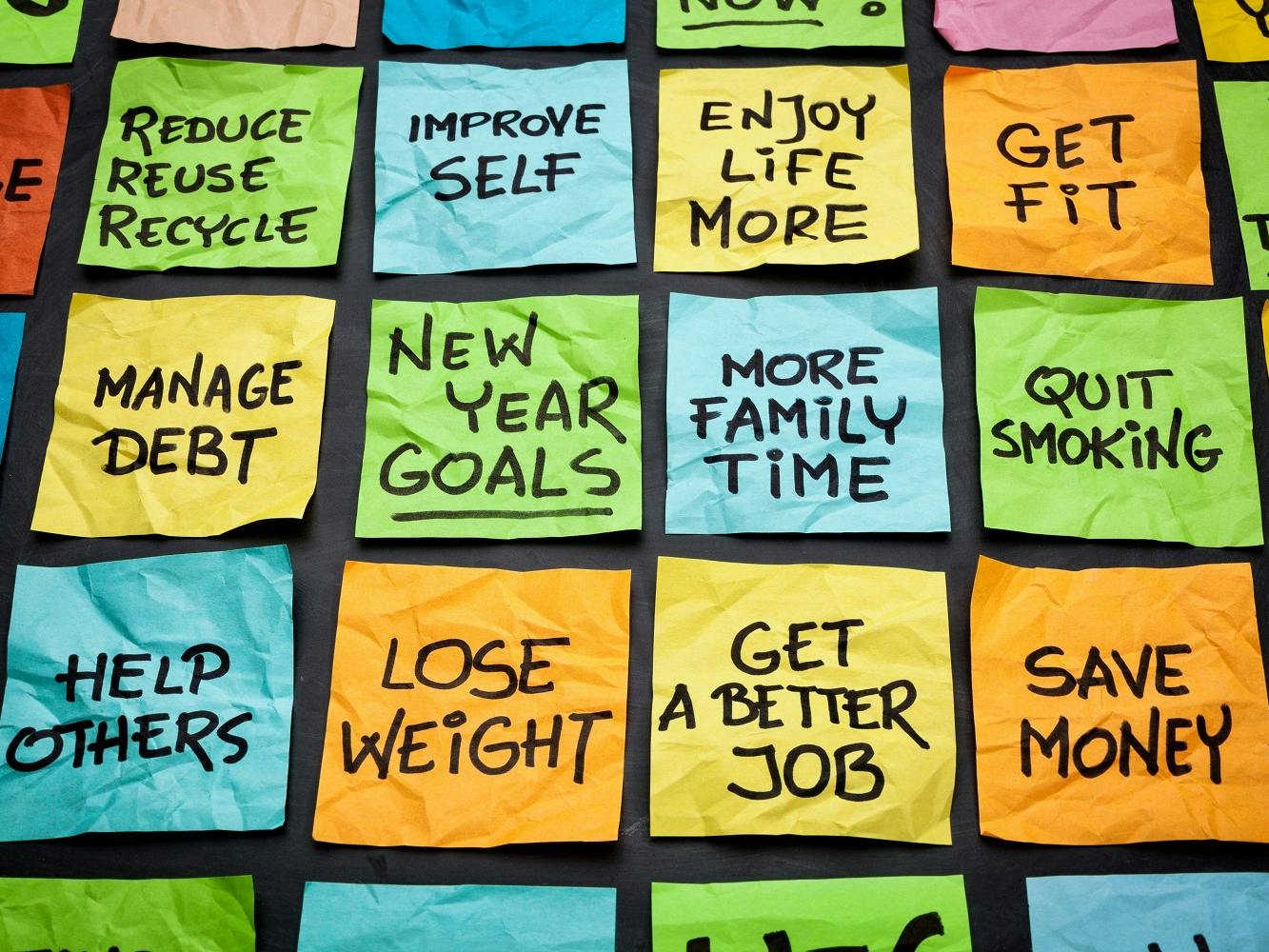
If you want to actually achieve your New Year's resolutions, you need to plan ahead. Here's how.
A new year, a new you. Every January 1st, millions of Americans wake up excited for the big changes they plan to make. Their New Year's resolutions. This is the year they're going to lose weight, save money, learn a new language. Whatever their goal, THIS is the year they'll make it happen.
Unfortunately, more than 90 percent of us will abandon our New Year's resolutions by Valentine's Day.
It doesn't have to be that way. If we change the way we approach our resolutions, our odds of success increase dramatically. And it all starts with changing the way you think.
1. Change Your Thinking, Change Your Life
According to Psychology Today, the main reason we abandon our New Year's resolutions is that we rely on motivation to see us through big changes. But as anyone who has tried to start exercising can tell you, motivation can be pretty scarce when it's cold outside and your bed is comfy and warm.
It's easy to stay motivated to do something you enjoy. When have you ever had to talk yourself into watching your favorite show? But we have to work a lot harder (mentally) to do something more difficult, like make a fruit salad for dessert instead of a bowl of ice cream.
Psychologists call that difficulty friction. Think of friction as the mental roadblocks we all throw up that make it nearly impossible to achieve goals on motivation alone. The following steps will help you change your way of thinking, significantly increasing your odds of achieving your goals.
2. Plan to Fail
If you want to be successful in your New Year's resolutions, you need to plan to fail.
This isn't some reverse psychology thing. We don't mean that you should just assume you aren't going to be successful. No, when we say, "plan to fail," we mean that you should have a plan for when you hit one of those motivation roadblocks.
Every decision you make is a tiny stressor. Known as decision fatigue, it's why a lot of successful people develop habits like wearing the same outfit every day. That's one less decision they have to make and the more decisions you make throughout the day, the harder it becomes to make "smart" choices.
Your plan to fail starts with mental contrasting. This visualization technique involves naming your goal, imagining what achieving that goal will feel like, and then picturing the obstacles you might meet when pursuing your goal.
The next step is developing an if-then strategy. Known as implementation intentions, the idea is to decide ahead of time how you will respond to those obstacles you pictured during the mental contrasting step. "If X happens, then I will Y."
With your plan in place, you're less likely to give in when temptation rears its ugly head. And, of course, having an if-then strategy means you have one less decision to make.
3. Start Small
You remove friction when an activity becomes a habit. And it's easier to build a habit when you start small. Want to eat healthier? Add a single serving of vegetables to your regular diet. When that becomes a habit, add a piece of fruit to your day. Want a cleaner house? Start by simply washing a dish when you're finished with it. These are small changes that over time add up to big results.
There's another benefit to making small changes and that's the endorphin rush you get every time you accomplish something. Even small "wins" cause your body to release endorphins, your brain's happy drug. Soon, you'll associate those happy feelings with eating an apple with breakfast and you won't have to motivate yourself to eat healthy. The behavior will become automatic.
4. Build Trust in Yourself
If you want someone to trust you, you take care to always be honest and follow through on promises. It should be just as important to trust yourself. And every time you implement one of those small changes in the previous step, you're building trust in yourself.
That means not making grandiose promises you can't keep. Would you tell your boss that 20-page report will be ready by lunchtime if you know it's going to take at least a day just to gather all the data? No? Then why would you tell yourself you'll go to the gym every day when your current exercise routine is your daily walk to the mailbox?
This step goes hand-in-hand with those small changes. Make a commitment to go for a walk during your lunch break, sign up for a dance class, or join a community softball team. Then do it. Or, if you're really determined to join a gym, at least be realistic and set a schedule you know you can maintain.
5. Challenge and Reward Yourself
Creating small challenges for yourself every day helps create that terrific feeling of accomplishment we all crave while also making it easier to build trust in yourself. Do you like to unwind at night with an episode of your favorite show? Make it your reward for taking that walk during your lunch break. Are ice cream sandwiches your favorite sweet treat? Only indulge after you've met your daily allowance of fruits and vegetables (that's five to seven servings, by the way).
Not only is the challenge-reward system good at helping build your self-trust, it will also help you power through those roadblocks that make you want to throw in the towel on your resolutions.
6. Focus on the Positive
Even in the best of times, it's easy to focus on the negative. But when we consciously focus on the positive, the negative seems to just fade away. One rule in our house is that, when talking about our day, we have to say three good things that happened before we can complain. Once we implemented that rule, we found that the kids – and the parents! – often had a hard time remembering the day's little annoyances.
This isn't a new idea. Lots of people choose to start and end their day with a gratitude list. It's a good technique to help train your brain to focus on the good stuff. If it's hard to remember sometimes, try creating a gratitude list and posting it on the bathroom mirror, refrigerator, or wherever you think it will do the most good.
7. Develop Self-Awareness
Do you make decisions based on who you are? Or, like most people, are your decisions based on who you want to be?
There's a big difference. If you know you can't resist your favorite sweet treats, why would you keep them in the house? If you're a natural night owl, why would you force yourself to wake before dawn?
This doesn't mean you shouldn't try to make changes. It just means you should be realistic about how you make those changes. Understanding your strengths and weaknesses helps increase your odds of success.
For example, my favorite sweet treat is ice cream. I know I can't resist it, so I don't keep it in the house. When I want ice cream, I have to either take a walk or get in my car to get it. My preference is taking a walk to the local ice cream shop. That way, I burn some calories, get my treat, and there are no leftovers in the freezer to tempt me.
When my husband was trying to change his spending habits, he went on a cash diet and left his debit and credit cards at home. Paying with cash made him much more aware of how he spent money and those $5 and $10 charges slowly disappeared from our transaction history.
Being honest about who you are can be tough, but it's a key component of achieving your goals.
8. Set SMART Goals
The final step is setting SMART goals. SMART goals are:
- Specific
- Measurable
- Attainable
- Realistic
- Timely
SMART goals are very precise in describing what you want to achieve. Examples:
- Instead of save more, set a goal to save $1,000 by December 31
- Instead of lose weight, set a goal to weigh 140 pounds by December 31
- Instead of improve credit rating, set a goal to have a credit score of 740 by December 31
Those are the ultimate goals. But remember, we're making small changes, so each SMART goal needs its own list of SMART goals. If your goal is to save $1,000, you might start by making a list of all the ways you can find extra money in your budget. Exchange cable for Netflix. Brew your own coffee instead of going to Starbucks. Order takeout once a month instead of once a week. And again, be specific:
- Cut $20 from the monthly budget by February 1.
- Have $200 in savings by March 31.
- Etcetera...
Following these steps makes it much more likely that you'll achieve your New Year's resolutions.
Additional resources
- ClearMatch Medicare: Find a Medicare Plan
- Psychology Today: Choose the Path of Least Friction to Change Your Behavior
- University of California: SMART Goals: A How-to Guide
- Mayo Clinic: Positive Thinking



